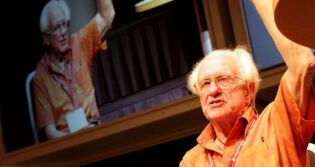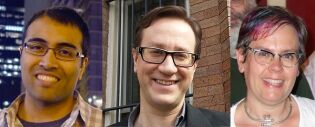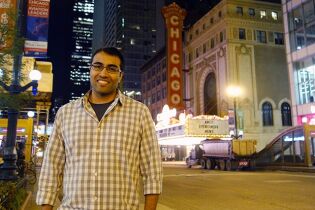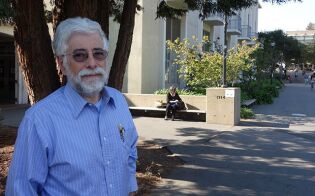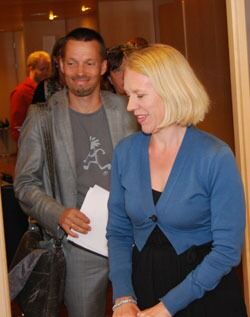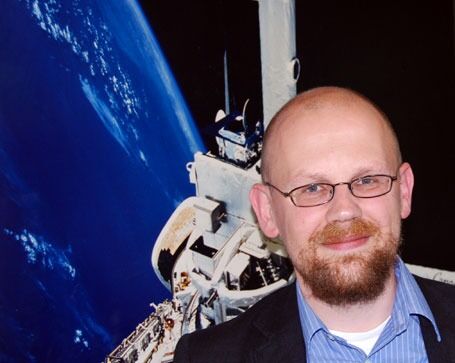
As a scientist, Øystein Elgarøy is used to rejecting hypotheses that are not supported by facts. Finally, he had to admit that this way of thinking must also apply to the hypothesis of God.
Øystein Elgarøy - Christian defender turned atheist
#A short time ago, astrophysics professor Øystein Elgarøy was a well-known liberal Christian, who defended his faith in articles and debate meetings. ...
Publisert: 26.06.2008 kl 13:49
Sist oppdatert: 27.06.2008 kl 09:43
A short time ago, astrophysics professor Øystein Elgarøy was a well-known liberal Christian, who defended his faith in articles and debate meetings. But then he discovered that he, in fact, agreed more with his opponents.
Text: Even Gran
Norwegian version published: June 16, 2008
The first time the undersigned became acquainted with Øystein Elgarøy was in a debate meeting on faith and science at a pub in Oslo in the autumn of 2005.
Elgarøy was in attendance with his evident astrophysics professor clout, assuring the gathering that there was no discrepancy between his special field and the existence of God. If anything, our knowledge of cosmos points towards the existence of a God, he maintained. The arguments from the atheists in the panel, among others biology professor Dag Hessen, were lost on him.
Somewhat later, in 2006, the book "Tro og vitenskap - sammenheng eller sammenstøt" (Faith and Science - Coherence or Collision) was published by the christian publisher Lunde Forlag. Also in this book Elgarøy brought the matter forward, and his response to the title of the book was without doubt "coherence".
- Beautiful symmetry and simple laws govern nature (...). The creative hand of God I see most clearly in the beauty of these laws of nature, said Elgarøy in the interview he gave in the beginning of the book together with nun and astrophysicist Katarina Pajchel.
But this was before he listened to a debate on a Sunday in January this year, between atheist Christopher Hitchens and theologian Alister McGrath.
Less complicated to agree with the opponent
- Suddenly I understood that it was much easier to agree with Hitchens than with McGrath. In short, I agreed more with the person I was supposed to disagree with. Then I realised that I had to face the consequences. I could no longer live with an illusion. You might say that this Sunday became a sort of turning point for me, says Elgarøy to Fritanke.no.
He confirms that this, of course, has been a gradual process of maturing. His frustration with the book "The Dawkins Delusion" by the above mentioned Alister McGrath was one of the decisive factors. In this book McGrath tries to contend with atheist Richard Dawkins' attack on the Christian faith in the book "The God Delusion".
- I read McGrath's book, hoping to find some good answers to the challenges from Dawkins, but the book was a huge disappointment. When I read the book it crossed my mind that "is this really the best a theologian is able to come up with". I don't think that he proposed any adequate arguments. In many ways, it was a surprisingly weak response, says Elgarøy.
Irrational to believe without reason
He adds that, even if both Dawkins and Hitchens are perhaps not submitting the most sophisticated arguments against religious faith, it is difficult for Christians to present satisfactory rejoinders to the main accusation that no empirical evidence exists to justify the truth of the Christian faith, or any other religion.
- This is not good enough for me. As a scientist and astrophysicist, I am used to discarding hypotheses that don't measure up. This has made it increasingly difficult for me to hold on to the premise of God. Rationally, I was unable to substantiate the hypothesis, and, finally, I had to admit that I could not live with a specific exemption for claims concerning God's existence. That was probably what I finally realized, on that Sunday in January, he says.
- Thus, you are no supporter of the widespread thinking that religion and science belongs to "two not-overlapping spheres"?
- I used to think like that before. But in fact, I cannot see any reason to believe in the existence of more than one single reality. Consequently, religious arguments also deal with this one single reality, and have to face critical analysis, and also rejection, if the theory doesn't measure up.
- You are saying that you were unable to substantiate the faith in God in a rational way. Do you think that believing in God is irrational?
- Yes, this is my opinion. It is irrational to cling to something that is not, by far, the best explanation, without any empirical support. When you scrutinize the Christian concept of God, it always ends up as a far-fetched idea, he says.
Elgarøy emphasises that there is a lot of other strange details you are compelled to believe in, if you want to become a Christian. You must accept the whole bag of "tricks", which makes faith even more difficult.
- An example: All these healings and miracles. As a scientist, I cannot believe that such things happen now, and thus I cannot accept that events like that took place 2000 years ago either. Another problem: Why not, rather, become Muslim or Hindu? How can Christians claim that they are right and all others are wrong, when they have no empirical foundations to support their faith? When I was a Christian, I was unable to come up with any good answers to these questions, he says.
The existence of evil was also a problem Elgarøy struggled with.
- A number of incidents and events in the world today are incompatible with the existence of an intrinsically good and almighty God, and all Christian attempts to argue against this seem far-fetched and futile, he says.
Liberating to steer clear of the Christian defense
Little by little, Elgarøy realised that the puzzle is easier to solve if you take as a starting point that God doesn't exist, and that everything has been made by human beings and natural processes.
- In short, reality and theory are more compatible in this way. If God and the religions have been created by human beings, and not the other way round, this goes to explain a majority of the contradictions in terms fazing today's Christians. For instance, the existence of evil does not pose any problem if our environment is created by natural processes that do not distinguish between good and evil. All variations within and between religions do not constitute any mysteries, if you take for granted that religions were created by human beings. However, this becomes a big problem for a person with a Christian life stance, he says.
- How did you personally react to the loss of faith?
- It was not a harrowing experience. Absolutely not. It felt liberating. Suddenly, I felt free to use my energy on other activities than defending contradictory faith dogmas and justifying the fact that I still defined myself as a "Christian". It was a relief to avoid this pressure.
He adds that, actually, he never did have any strong religious experiences like the ones reported by other believers. This has consequently never been any loss to him.
"Kirke og Kultur"-article started the process
Øystein Elgarøy grew up in a family with active members of the Evangelical-Lutheran Free Church, and in his teens he was a relatively conservative Christian.
- In the beginning I found all the answers I needed in the Bible, but, gradually, as I reached adult years and started my college education, I understood that the conservative Christian faith didn't measure up. I became more and more liberal, and, finally, there was nothing left, other than my belief that "maybe there is a God". And, then I was in shallow waters, he says.
However, it was only a few years ago that he really did take an interest in the coherence between faith and science.
- Around 2004 - 2005 I was asked to write an article for the Norwegian periodical Kirke og Kultur (Church and Culture) pertaining to the connection between Christian faith and my special field, cosmology. Before this, I just divided faith and science into two different spheres, and did not reflect very thoroughly on the issue. But, through my work with this article, I was forced to think about the borderlines between my own professional knowledge and my faith. This work made me more and more conscious of what you, in fact, can know. You could say that this article in Kirke og Kultur was the beginning of my deviation away from the Christian path, says Elgarøy.
Liberal Christian abstractions give no meaning
Elgarøy doesn't fancy liberal Christianity with their abstract concept of God and notion that whether God "exists in reality" really isn't that important.
- This does nothing for me. The abstract generalisation practiced by liberal Christians seems to me like senseless stupidity. In fact, whether a God actually exists, is an important question. There is no doubt that God is found "in the mind's eye", "in the language", or "as a concept". However, that is not the crux of Christianity. The issue is the existence of a personal God, responsible for the creation of what we know. If we are unable to believe in this concrete, personal image of God, then we are not Christians, in my opinion.
He is not willing to perceive this as anything else than an either/or question.
- Either you have faith in this God, or you don't. The Christian faith is either true, or it is untrue. There is no middle ground, underlines Elgarøy.
- Do you think that the abstraction and generalisation of liberal Christians are attempts to make their own religious attachment easier to defend?
- Yes. I think this applies to a lot of people. In any case, that was how I felt. I resorted to this strategy in order to get away from the concept of God that became gradually more difficult to defend rationally, viz. the belief in the actually existing, personal, creating and conscious God. You cannot blissfully ignore the fact that this personal concept of God is absolutely essential for a Christian faith, he says.
- Basically, the individual is the only source of moral and ethics
On our way out, the astrophysicist is presented with the last hardcopy issue of Fri Tanke, fresh from the publishers. But, there is no need for that, we understand.
- I'll get it in the mail. Actually, I have just become a member of the Norwegian Humanist Association, he informs us.
- What made you join?
- It felt like a natural thing to do. It is extremely important to me that it is possible to uphold moral and ethics without God. Even when I called myself a Christian, I did not, in fact, profile my own moral and ethics on the Bible and the word of God. In my opinion, the only acceptable kind of ethics is based on an individual starting point and human reason, he says.
Translated by Tone Haugen Jensen
This story has also been translated by blogger Strappado and published on Richard Dawkins' website. The story has yielded hundreds of comments.
English Vis flere
It was difficult, but this summer "The Friendly Atheist" Hemant Mehta, the man behind one of America's best known atheist blogs, chose to quit teaching to become a full time blogger.
Refutes secularization of the US:
«Growth of the religiously un-affiliated not linked to personal faith»
«They enjoy being obnoxious», American sociologist Claude Fischer says about the new atheists. He also claims religious faith in the US is not declining. (Sept. 16, 2014)

